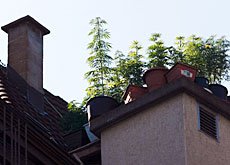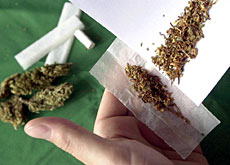Cannabis lobby rises from the ashes

A group of politicians and drugs experts is making a new attempt at decriminalising cannabis in Switzerland.
Eighteen months after parliament threw out a similar plan the committee has collected enough signatures to force a nationwide vote on the issue.
“Our aim is to decriminalise cannabis consumption under strict rules, and encourage parliament to draft its own compromise solution,” parliamentarian Ursula Wyss told swissinfo.
She says it makes no sense to treat the estimated 500,000 regular or occasional pot smokers – from all walks of life – like criminals.
The proposal foresees setting age limits for cannabis consumers or a licensing system for shops selling psychoactive hemp.
The people’s initiative with more than 105,000 signatures was handed in to the federal authorities in Bern on Friday.
Wyss said it was not calling for the outright legalisation of the cannabis trade, which is prohibited under an international agreement.
Effective checks and controls of the trade were an essential element to be able to crack down on illegal dealers, Wyss added.
Young consumers
Wyss said it wasn’t possible to say whether a possible liberalisation would have an impact on the number of cannabis consumers.
But she is concerned about recent statistics which show that Switzerland has one of the highest rates of young pot consumers in Europe and that the drug increased in popularity in the 1990s.
“I think very restrictive rules have to be set to protect children and youth. It must be clear that the measures are enforced, for cannabis and alcohol alike.”
Wyss, a member of the centre-left Social Democratic Party, is confident that a broad alliance with the centre-right Radicals and Christian Democrats could clear the air for a viable political compromise.
In June 2004 the House of Representatives refused to follow the Senate in discussing proposed amendments to the law on narcotics.
The Swiss Institute for the Prevention of Alcohol and Drug Abuse has declined to comment on the details on the latest initiative, but it has come out in favour of decriminalising cannabis in principle.
“It also makes it easier to treat addicted pot smokers and the patients in turn don’t face major obstacles when they’re looking for help,” said spokeswoman Janine Messerli.
Hardline
Unimpressed by the overtures from other quarters, the rightwing Swiss People’s Party is standing by its hardline stance on drugs.
“We’re against liberalising cannabis. There is ample scientific proof gathered over the past 40 years to show that pot smoking is not conducive to your health,” said party spokesman Roman Jäggi.
He believes the attitude in society towards drugs has changed in the recent past and people are keen to see more discipline in place.
“Switzerland has been too liberal in its drugs policy. We welcome increased police efforts to close illegal hemp shops. But clearly more needs to be done to stop children as young as 12 smoking cannabis.”
Pioneer
It is likely to take more than two years before the initiative will come to a nationwide ballot.
If it were to win voters’ acceptance Switzerland would become the first country in the world to decriminalise the purchase, possession and consumption of cannabis.
Proponents hope that Switzerland, which is not a member of the European Union, would act as a model for other countries.
Switzerland became notorious for its liberal narcotics policy, notably the public drug scenes in the country’s major cities in the 1980s and 1990s.
In response the government implemented its four-pillar strategy of repression, prevention, therapy and harm reduction.
swissinfo, Urs Geiser
At least 100,000 signatures are required to force a nationwide vote on a people’s initiative or any other constitutional amendment.
Following the validation of the signatures it can take up to four years before voters have the final say at the ballot box.
In the 1990s Swiss voters rejected two contradictory proposals seeking to tighten, in one case, and in the other to ease the official drugs policy.
In 2004 the Swiss parliament threw out a government plan to decriminalise cannabis.
A Federal Health Office survey shows that 46% of the 13-29 age group has tried cannabis at least once. One in ten are regular consumers – putting Switzerland among the top countries in Europe.
Since 1991 the Swiss government’s drugs policy has been based on four principles: repression, prevention, harm reduction and therapy/social integration.

In compliance with the JTI standards
More: SWI swissinfo.ch certified by the Journalism Trust Initiative












You can find an overview of ongoing debates with our journalists here . Please join us!
If you want to start a conversation about a topic raised in this article or want to report factual errors, email us at english@swissinfo.ch.